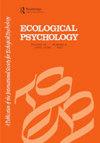所有的启示都是社会性的:吉布森社会本体论的基础
IF 1.7
3区 心理学
Q3 PSYCHOLOGY, EXPERIMENTAL
引用次数: 15
摘要
生态心理学是建立在感知本体论的基础上的。主要的焦点是解释个体动物的感知和行为行为。为了在生态学方法中容纳社会现象,有必要扩展本体论,但理论家们一直不清楚如何做到这一点。本文提出了一个消极的论点和一个积极的纲领纲要。消极的论点是反对使用“社会支持”这个术语,这个术语混淆了研究人员和动物的观点。相反,它提倡我们接受,作为一个有效的假设,声称所有的支持都是社会性的;也就是说,所有的支持都是公开的,原则上是可以被第三方观察到的。然后,纲领性大纲表明,单凭能力是不足以描述社会意义的。生态社会本体论需要新的工具来描述交互过程、象征意义和物质文化作为在人口稠密的环境中发生的结构。本文章由计算机程序翻译,如有差异,请以英文原文为准。
All Affordances Are Social: Foundations of a Gibsonian Social Ontology
Abstract Ecological psychology is built on a perception-oriented ontology. The primary focus has been on explaining the perception and action behavior of individual animals. To accommodate social phenomena within the ecological approach, it is necessary to expand the ontology, however theorists have been unclear about how to do this. The paper presents a negative argument and a positive programmatic outline. The negative argument is against the use of the term ‘social affordance’, a term that confuses the perspective of the researcher with that of the animal. Instead, it is advocated that we adopt, as a working hypothesis, the claim that all affordances are social; that is, all affordances are public and are, in principle, observable by a third party. The programmatic outline then shows that affordances alone are insufficient for describing social meaning. An ecological social ontology requires new tools for describing interaction processes, symbolic meaning, and material culture as structures occurring within the populated environment.
求助全文
通过发布文献求助,成功后即可免费获取论文全文。
去求助
来源期刊

Ecological Psychology
PSYCHOLOGY, EXPERIMENTAL-
CiteScore
3.30
自引率
10.50%
发文量
8
期刊介绍:
This unique journal publishes original articles that contribute to the understanding of psychological and behavioral processes as they occur within the ecological constraints of animal-environment systems. It focuses on problems of perception, action, cognition, communication, learning, development, and evolution in all species, to the extent that those problems derive from a consideration of whole animal-environment systems, rather than animals or their environments in isolation from each other. Significant contributions may come from such diverse fields as human experimental psychology, developmental/social psychology, animal behavior, human factors, fine arts, communication, computer science, philosophy, physical education and therapy, speech and hearing, and vision research.
 求助内容:
求助内容: 应助结果提醒方式:
应助结果提醒方式:


